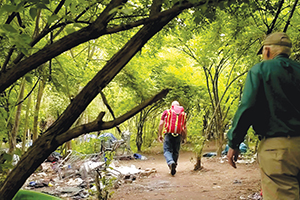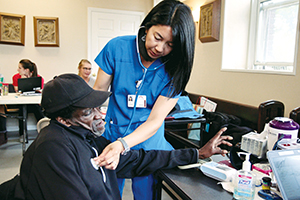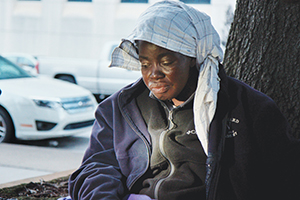Trinity Health systems take care to the streets
By KIM VAN OOSTENPhotos by CHRIS RYAN/© CHA
"Is anyone home? It's Mount Carmel," call out two outreach workers from Mount Carmel Health System, as they walk through a syringe-ridden footpath to a hidden tent encampment near Columbus, Ohio. Their backpacks are stocked with medicines, bandages, toiletries, clothing and even some bus passes.
In Atlanta, another street medicine team — this one from the Mercy Care network of primary care clinics — is reaching out to men and women living on the city's sidewalks, in doorways and in underpasses — people who may be invisible to most Atlantans.

Street medicine team members Steve Roth, center, and Dr. John O'Handley visit a homeless encampment near Columbus, Ohio. Roth is a medical technician, and O'Handley is medical director of community health and well-being for Mount Carmel Health System.
Both street medicine programs provide people who are homeless with health care access as well as with assistance getting into permanent housing, signing up for veterans' benefits and finding a job. For that work in Columbus and Atlanta, Trinity Health is the 2019 recipient of CHA's Achievement Citation, the association's recognition for a program that best exemplifies the Catholic health ministry's commitment to Jesus' compassion and healing.
"The beauty of street medicine is that it takes health care to where it is needed the most," said Dr. Mouhanad Hammami, senior vice president of safety net transformation, community benefit, health and well-being for Trinity Health of Livonia, Mich.
Trinity's street medicine programs in Columbus, Atlanta and Pittsburgh (which won the Achievement Citation in 1994), provide urgent health services such as wound dressing to the unsheltered. Staff are patient but goal-oriented as they open pathways to more conventional health care and housing for folks who have lived on the streets for months or years.
Both street medicine programs can provide access to primary care and specialty medical care including mental health services, dental care, vision care and social services.
Before they can do that though, staff must build trust with individuals who have little reason to think the system will work for them, said Hammami.
"Once we build that trust and they know that our only goal is to help them, then (we work to) establish a medical home to address their needs and look out for their best interest."
Medicine on the go
In Columbus, there are more than 1,800 unsheltered people, according to a 2018 point-in-time count. The Mount Carmel Outreach program work targeting this population includes the street outreach program and a mobile clinic, which is equipped with two exam rooms.
The mobile clinic functions as an urgent care center of sorts. The clinicians provide health assessments and screenings, and they treat acute and chronic illness and mental conditions. Staffed by eight to 10 professionals, including nurses, medical technicians, caseworkers and patient registration workers, the clinic travels a regular weekly or biweekly circuit, returning to about nine sites near soup kitchens, drop-in centers, churches and in areas where homeless people can be found.
Mount Carmel's street medicine program employs 22 people. Smaller teams — usually a physician or nurse practitioner, a medical technician or nurse, and a patient advocate — make regular visits to encampments and areas with a higher density of unhoused people. The clinicians provide medical attention and work to build relationships so that, over time, patients may consider going to the mobile clinic or acting on the team's referrals to fixed-base medical and social service providers.

A street medicine team clinician from Mount Carmel Health System cares for a patient at a temporary clinic for people who are homeless.
Medical technician Steve Roth has been a part of Mount Carmel's street medicine team for 20-plus years. He said people living on the streets seek out the clinicians making their rounds and point them to others who need care. "They say, 'Hey, this person's over behind here. This person's in this alley. This person's underneath this bridge' … and then we go find them."
The Mount Carmel street medicine program had more than 6,000 encounters last year, of which 2,500 were unduplicated patients. This count includes patients of both the on-foot and mobile coach teams. Adults of all ages access the services, but most of the patients are in their 30s, 40s or 50s. Most are eligible for Medicaid coverage, though some do not wish to identify themselves to the government, according to information from Mount Carmel.
Brian Pierson, regional director for Community Health and Well-being at Mount Carmel, said the street medicine program has become a de facto medical home for some individuals who distrust the traditional health care system.
"We are the last, the lowest and I think the most significant safety net for so many different people," Pierson said. "We see people that don't have anywhere else to turn and we hang with them long term. We are committed to them, and they are committed to us."
Mercy Care's fleet
Atlanta is home to more than 3,000 unsheltered people, according to a 2018 point-in-time count. Mercy Care has six brick-and-mortar clinics and four mobile sites that provide integrated primary care and behavioral health services for people who are homeless and uninsured. Mercy Care has a fleet of vehicles including a large coach with two exam rooms, vans, shuttles and cars that are used for patient care and social services. The street medicine team delivers integrated primary and behavioral health care to the homeless on the streets, under bridges and in encampments.

A client of the Mercy Care street medicine team in Atlanta.
The mobile clinics make regular stops at churches, shelters and other locations. The team staffing the medical coach includes a nurse practitioner, a case manager, a licensed practical nurse, a psychiatrist, and volunteer medical providers including medical students. Mercy Care's street medicine team in–cludes a mix of paid staff and clinician volunteers. These teams go out on weekdays and nights to reach people who are unwilling to go to one of Mercy Care's mobile clinics or fixed locations in Atlanta, said Tom Andrews, chief executive of Saint Joseph's Health System, parent company to Mercy Care.
Mercy Care collaborates and coordinates with Atlanta's Grady Health System, as well as social services case management organizations that guide people to permanent housing placement.
In 2018, Mercy Care's street medicine program had nearly 3,500 encounters with unsheltered people, and provided 680 primary care visits, 428 psychiatric visits and 66 treatments by a nurse.
Patience is paramount
Like their peers in Columbus, the Atlanta crew takes time building relationships with patients who are on society's margins.
"I actually looked at all the data and for the types of clients that we are focusing on, it takes about 15 engagements to get a person to agree to start working with you," said Joy Fernandez De Narayan, street medicine manager at Mercy Care.
"Let's say I see you once a week, 'Hey, do you want to see me today?' I ask and the person says, 'no,' so I say, 'here's a snack bag, can I come back and see you next week?' We can do that 15 weeks in a row for them to finally be like, 'OK, what do you have to offer?'" explained De Narayan.
Then, De Narayan said, the team can start the process of trying to get the person connected to social services, with the ultimate goal of securing permanent housing. Social supports continue after a client moves into permanent housing because the transition from the street to an apartment can be unsettling.
Lonely move
Mathew Reed, a Mercy Care case manager in the street medicine program, said newly housed individuals may feel so isolated that they seek the company of their old neighbors in a homeless encampment. Ultimately, some individuals may give up their newfound housing and return to the streets.
To assist with the transition from street to apartment, the street medicine team makes "housing rounds," checking in on clients in their new apartments, reinforcing the power of that relationship and letting clients know that someone does care.
For individuals helped by the program, the impact is life changing. Reed said, "A lot of folks will say, 'You guys gave me hope … you just saw me and you sat with me.'"